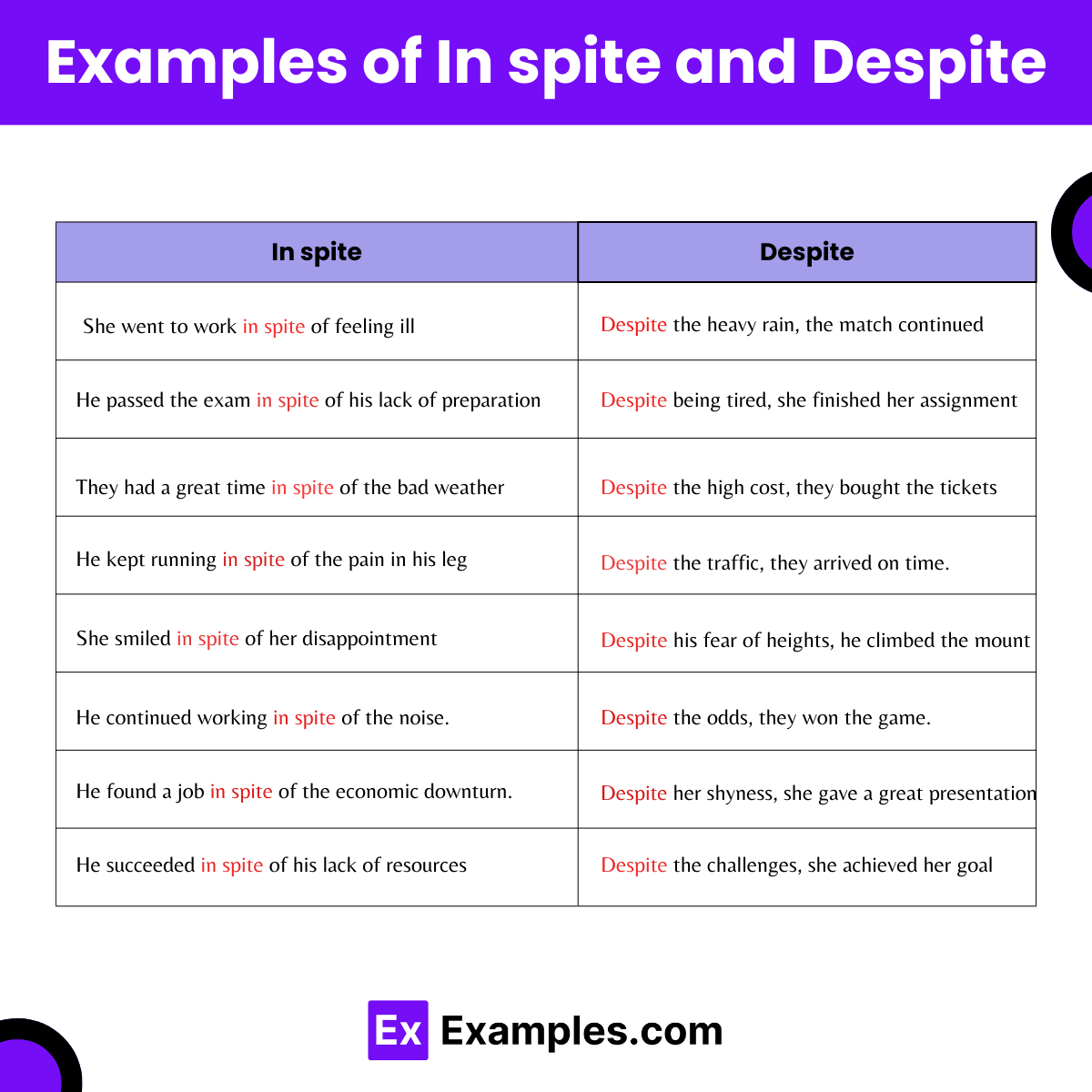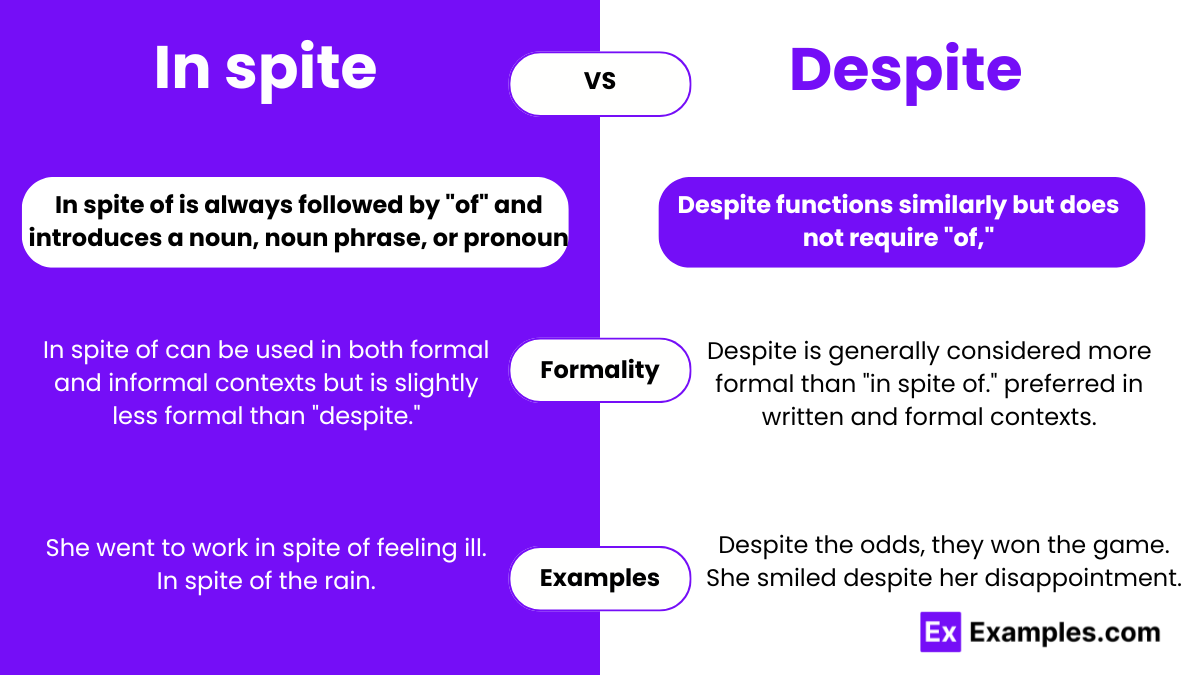20+ In spite vs Despite Examples
In spite and despite are prepositions used to show contrast or contradiction between two ideas, indicating that something happened or was true even though there was something that might have prevented it. Despite is the more formal term and is often used without “of,” whereas in spite of always includes “of.” For example, “She went for a walk despite the rain” and “He succeeded in spite of the difficulties.” Both terms are interchangeable and convey a sense of overcoming obstacles or adverse conditions.
What is In spite and Despite?
In spite and despite are prepositions used to indicate that an action or event occurred regardless of an obstacle or opposing factor. In spite of is always followed by “of” and introduces a noun, noun phrase, or pronoun, as in “She finished the marathon in spite of her injury.” Despite functions similarly but does not require “of,” such as in “He succeeded despite the challenges.” Both terms highlight that something happened contrary to expectations or difficulties.
Examples of In spite and Despite

- She went to work in spite of feeling ill.
- Despite the heavy rain, the match continued.
- He passed the exam in spite of his lack of preparation.
- Despite being tired, she finished her assignment.
- They had a great time in spite of the bad weather.
- Despite the high cost, they bought the tickets.
- He kept running in spite of the pain in his leg.
- Despite the traffic, they arrived on time.
- She smiled in spite of her disappointment.
- Despite his fear of heights, he climbed the mountain.
- He continued working in spite of the noise.
- Despite the odds, they won the game.
- She remained calm in spite of the chaos around her.
- Despite the warnings, they went ahead with the plan.
- He found a job in spite of the economic downturn.
- Despite her shyness, she gave a great presentation.
- They enjoyed the picnic in spite of the wind.
- Despite the distance, they maintained their friendship.
- He succeeded in spite of his lack of resources.
- Despite the challenges, she achieved her goal.
Differences Between In spite and Despite
| Aspect | In spite | Despite |
|---|---|---|
| Usage of “of” | Always includes “of” | Does not require “of” |
| Example | “She went to the party in spite of feeling tired.” | “She went to the party despite feeling tired.” |
| Formality | Slightly less formal, used in both contexts | More formal, preferred in formal contexts |
| Structure | Followed by a noun, pronoun, or gerund | Followed by a noun, pronoun, or gerund |
| Interchangeability | Can be used interchangeably with “despite” | Can be used interchangeably with “in spite of” |
| Examples in Context | “In spite of his busy schedule, he made time for his family.” | “Despite his busy schedule, he made time for his family.” |
- Usage of “of”:
- In spite always includes “of” when used in a sentence. Example: “She went to the party in spite of feeling tired.”
- Despite does not require “of.” Example: “She went to the party despite feeling tired.”
- Formality:
- Despite is generally considered more formal than “in spite of.” It is often preferred in written and formal contexts.
- In spite of can be used in both formal and informal contexts but is slightly less formal than “despite.”
- Structure:
- In spite of is always followed by a noun, pronoun, or gerund. Example: “In spite of the rain, they enjoyed the picnic.”
- Despite is also followed by a noun, pronoun, or gerund. Example: “Despite the rain, they enjoyed the picnic.”
- Interchangeability:
- Both terms can be used interchangeably without changing the meaning of the sentence. However, the choice between them may depend on the level of formality and stylistic preference.
- Examples in Context:
- In spite of: “In spite of his busy schedule, he made time for his family.”
- Despite: “Despite his busy schedule, he made time for his family.”
Usage of In Spite and Despite
Uses of “In Spite”
- Contrasting Statements:
- In spite of the cold weather, they went swimming.
- Highlighting Overcoming Obstacles:
- He succeeded in spite of his lack of resources.
- Expressing Unexpected Outcomes:
- She smiled in spite of her disappointment.
- Showing Determination:
- They continued their journey in spite of the storm.
- Emphasizing Persistence:
- She pursued her dream in spite of many failures.
Uses of “Despite”
- Contrasting Statements:
- Despite the cold weather, they went swimming.
- Highlighting Overcoming Obstacles:
- He succeeded despite his lack of resources.
- Expressing Unexpected Outcomes:
- She smiled despite her disappointment.
- Showing Determination:
- They continued their journey despite the storm.
- Emphasizing Persistence:
- She pursued her dream despite many failures.
Synonyms for In spite and Despite
| Synonyms for In Spite | Synonyms for Despite |
|---|---|
| Regardless of | In spite of |
| Notwithstanding | Notwithstanding |
| Even with | Regardless of |
| Despite | Even though |
| Without regard to | Although |
| Though | In the face of |
| In defiance of | Against |
| Regardless | Without being affected by |
How to Pronounce In spite and Despite
In spite
- Pronunciation: in spahyt
- Breakdown:
- “in” sounds like “in” in “inside.”
- “spite” sounds like “spahyt” in “kite.”
- Phonetic Spelling: /ɪn spaɪt/
Despite
- Pronunciation: dih-spahyt
- Breakdown:
- “de” sounds like “dih” in “dinosaur.”
- “spite” sounds like “spahyt” in “kite.”
- Phonetic Spelling: /dɪˈspaɪt/
Exercises
FAQ’s
Can “in spite of” and “despite” be used interchangeably?
Yes, you can use “in spite of” and “despite” interchangeably without changing the meaning of the sentence.
Is “despite of” correct to use?
No, “despite of” is incorrect. Use “despite” without “of” or “in spite of.”
Which one is more formal: “in spite of” or “despite”?
“Despite” is considered slightly more formal than “in spite of.”
Can “in spite of” and “despite” start a sentence?
Yes, both can start a sentence. For example, “In spite of the rain, we went out.”
Is “in spite of” more commonly used in spoken English?
Yes, “in spite of” is more common in spoken English, while “despite” is often used in writing.
Can “in spite of” and “despite” be followed by a noun?
Yes, both are followed by a noun, noun phrase, or gerund. For example, “in spite of the delay” or “despite being tired.”
What is an example sentence with “in spite of”?
“In spite of the heavy traffic, she arrived on time.”
Does “despite” need “the fact that” for clauses?
Yes, for clarity. For example, “Despite the fact that she was late, she was welcomed.”
Can “despite” be used in place of “although”?
No, “although” is a conjunction and requires a clause, whereas “despite” is a preposition.
Which is more emphatic: “in spite of” or “despite”?
Both convey the same emphasis. The choice depends on the formality of the context.



